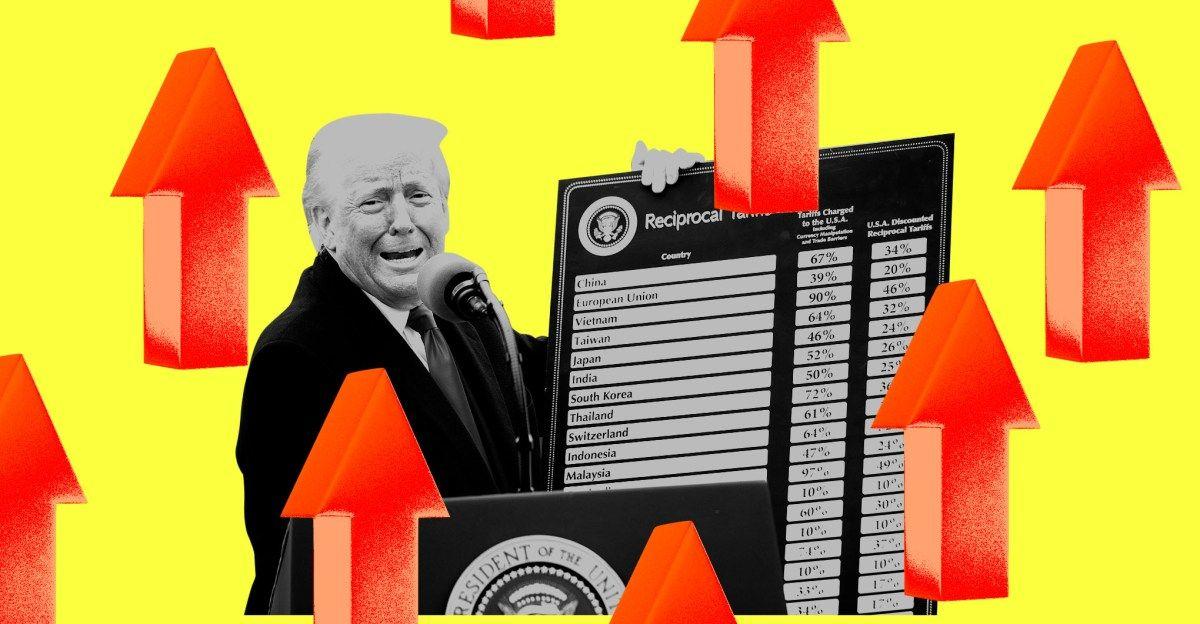Trump's AI Enthusiasm Clashes with Tariff Impact on Data Center Costs
2 Sources
2 Sources
[1]
Trump Loves AI But His Tariffs Ramp Up Costs for Data Centers
President Donald Trump is all in on artificial intelligence and the data centers that power it -- but his tariffs threaten to pile new costs on the US businesses spending hundreds of billions to build them. Data centers are booming by any measure, as tech giants from Microsoft Corp. to Amazon.com Inc. race each other - and China - for AI leadership. The industry now contributes a healthy chunk of US economic growth. But the centers have to be equipped once they're built, and much of the hardware comes from abroad, so trade wars could throw a wrench in the works.
[2]
Trump Loves AI But His Tariffs Ramp Up Costs for Data Centers
(Bloomberg) -- Supply Lines is a daily newsletter that tracks global trade. Sign up here. President Donald Trump is all in on artificial intelligence and the data centers that power it -- but his tariffs threaten to pile new costs on the US businesses spending hundreds of billions to build them. Data centers are booming by any measure, as tech giants from Microsoft Corp. to Amazon.com Inc. race each other - and China - for AI leadership. The industry now contributes a healthy chunk of US economic growth. But the centers have to be equipped once they're built, and much of the hardware comes from abroad, so trade wars could throw a wrench in the works. Trump has already imposed a 20% duty on China, and gone back and forth over a 25% charge for Mexico - the two biggest sources of US computer equipment imports. Steel and aluminum have gotten hit too. Many more tariffs are in the pipeline, and likely targets include countries that supply the data-center industry -- largely in Asia -- as well as some of the key components it relies on, like semiconductors. The extra cost might not deter deep-pocketed firms chasing an AI breakthrough that's seen as likely the biggest technological development of the era. Still, after the unveiling of China's DeepSeek model - which rattled financial markets with the suggestion of a lower-cost route -- it's another headwind for the industry. Projects could get more expensive, or face holdups, if an escalating trade war ends up disrupting supply chains. "We believe a broader application of tariffs globally could pose a significant downside risk to the US data center market, given its reliance on a global supply chain for materials and components purchased in high volume," said Niccolo Lombatti, digital infrastructure analyst at BMI, a Fitch Solutions company. Trump has been pushing for the development of US data centers and AI technology since his second term began. One of his first major announcements was an investment of as much as $500 billion in AI infrastructure by SoftBank Group Corp., OpenAI and Oracle Corp. The boom was well under way by then, adding as much as 0.3% to GDP growth last year, or roughly $100 billion, according to JPMorgan Chase & Co. analysts who predict the numbers will be in a similar ballpark this year. Just in the past few months, companies including Alphabet Inc.'s Google and Meta Platforms Inc. have announced new projects worth hundreds of billions of dollars. Assuming everything that's in the pipeline goes ahead as planned, and spending is evenly spread over the construction period, investment may rise as much as 64% this year and another 14% in 2026 before peaking at $135 billion in 2027, according to a Bloomberg Intelligence analysis. Electric Shock But industry chiefs are worried about Trump's tariffs, and analysts are raising concerns about budget overruns and delayed timelines. It's hard to pin down exactly what share of data-center equipment comes from outside the US. Even parts and materials that are sourced domestically could see price increases too, a knock-on effect that was apparent during Trump's first-term trade war. The Trump administration believes its plans to push energy prices down by cutting red tape and encouraging production will help offset tariff costs for businesses, something that's key to the data center industry where power is a major cost, a White House official said. Electricity producers, who count the power-hungry data centers as key customers, also see no sign of a pullback. Two of the biggest ones, Duke Energy Corp. and American Electric Power, said last month they see demand from the industry proceeding "full speed ahead." The tariff impact on electrical equipment for data centers is likely to be significant, said Ben Boucher, senior analyst for supply chain data and analytics at Wood MacKenzie. He calculates that costlier imports and domestic manufacturing as a result of Trump's trade measures so far would mean an increase in prices of about 8-9% for power transformers, 6-7% for switchgear, 3-4% for circuit breakers and 6-7% for wire and cable. The industry's dependence on foreign suppliers of equipment fits with a wider pattern that's seen the US become more dependent on various types of imported machinery. That's a hurdle for Trump's trade-war goal of reviving domestic industry while narrowing the trade gap, because when US firms seek to expand capacity at home, they often have to buy the machines they need from abroad. 'Proceed Regardless' Meanwhile, American businesses that sell equipment used in data centers overseas are also at risk of blowback from Trump's policies. Their products could get tariffed by other countries, and they're also seeking clarity on what restrictions might be placed on their exports of advanced technology, if Trump widens the curbs imposed by his predecessor Joe Biden. For now, there are few signs that investment in infrastructure crucial to AI is losing momentum. "Beyond cost pressures, demand for new data centers is so great that the vast majority of projects will proceed regardless of policy changes," said Michael Bellaman, president and chief executive officer of Associated Builders and Contractors. America's tech leaders have plenty of cash on hand for capital spending. After the surprise emergence of DeepSeek, whose low-cost open-source model raised questions about existing plans for data center and AI spending, they appeared unfazed. Microsoft, Amazon, Google and Meta -- four of the so-called Magnificent Seven -- recently increased their projected capital spending by some 32% from last year's levels, according to Bank of America. "This confirms that the AI capex cycle is intact -- no DeepSeek impact yet," strategists Ohsung Kwon and Savita Subramanian wrote in a February report. Still, with trade war angst spreading across the US economy and financial markets, even the hottest industries are unlikely to escape the fallout completely. "Tariffs are taxes on imports, and taxing imports increases prices," said Patrick Lozada, director of global policy at the Telecommunications Industry Association. "That's going to be true in data centers, just the same as it's going to be true for consumer products or for anything else." (Updates with power companies in 11th paragraph. An earlier version corrected the name of Associated Builders and Contractors.)
Share
Share
Copy Link
President Trump's support for AI development faces challenges as his tariff policies increase costs for data centers, potentially impacting the US's competitive edge in the AI race.

Trump's AI Ambitions and Tariff Tensions
President Donald Trump has positioned himself as a strong advocate for artificial intelligence (AI) and the data centers that power it. However, his administration's tariff policies are creating a complex scenario for the US tech industry, potentially increasing costs for businesses investing heavily in AI infrastructure
1
.The Data Center Boom and Economic Impact
The data center industry is experiencing unprecedented growth, driven by tech giants like Microsoft, Amazon, Google, and Meta racing to achieve AI leadership. This sector has become a significant contributor to US economic growth, adding as much as 0.5% to GDP growth last year, approximately $100 billion according to JPMorgan Chase & Co. analysts
2
.Tariff Challenges for the Tech Industry
Trump's tariff policies, including a 20% duty on Chinese imports and fluctuating charges for Mexican goods, are creating headwinds for the data center industry. Many components essential for data centers, including computer equipment and semiconductors, are sourced from abroad, primarily from Asian countries
2
.Cost Implications and Industry Concerns
Industry analysts are raising concerns about potential budget overruns and project delays due to these tariffs. Ben Boucher, a senior analyst at Wood MacKenzie, estimates significant price increases for various electrical equipment used in data centers:
- 8-9% for power transformers
- 6-7% for switchgear
- 3-4% for circuit breakers
- 6-7% for wire and cable
2
Trump Administration's Perspective
The Trump administration believes that its plans to reduce energy prices through deregulation and increased production will help offset the tariff costs for businesses. This is particularly crucial for the data center industry, where power is a major expense
2
.Related Stories
Industry Resilience and Continued Investment
Despite these challenges, the demand for new data centers remains strong. Michael Bellaman, president and CEO of Associated Builders and Contractors, states that "the vast majority of projects will proceed regardless of policy changes" due to the immense demand
2
.Major tech companies, including Microsoft, Amazon, Google, and Meta, have recently increased their projected capital spending by approximately 32% from last year's levels, according to Bank of America
2
.Global Competition and Future Outlook
The emergence of China's DeepSeek model has added another layer of complexity to the situation, suggesting a potential lower-cost route to AI development. However, US tech leaders appear undeterred, maintaining their substantial investments in AI infrastructure
2
.As the AI race intensifies globally, the interplay between Trump's pro-AI stance and his tariff policies will likely continue to shape the landscape of US technological advancement and economic growth in the coming years.
References
Summarized by
Navi
[2]
Related Stories
Recent Highlights
1
Pentagon threatens to cut Anthropic's $200M contract over AI safety restrictions in military ops
Policy and Regulation

2
ByteDance's Seedance 2.0 AI video generator triggers copyright infringement battle with Hollywood
Policy and Regulation

3
OpenAI closes in on $100 billion funding round with $850 billion valuation as spending plans shift
Business and Economy








